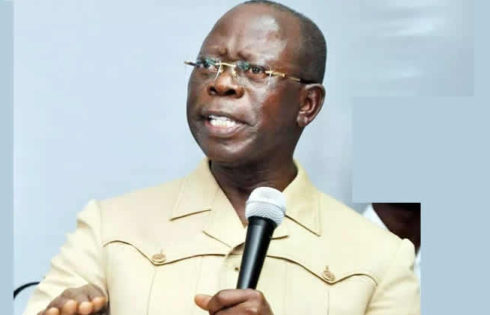 The Federal High Court in Abuja on Monday rejected a suit seeking an order compelling the Economic and Financial Crimes Commission to investigate certain corruption allegations against the National Chairman of the All Progressives Congress, Adams Oshiomhole.
The Federal High Court in Abuja on Monday rejected a suit seeking an order compelling the Economic and Financial Crimes Commission to investigate certain corruption allegations against the National Chairman of the All Progressives Congress, Adams Oshiomhole.
Justice Anwuli Chikere, in her judgment, struck out the case after upholding the separate notices of preliminary objection filed against the suit by Oshiomhole and the EFCC.
In her judgment, Justice Chikere held that the plaintiff, Bishop Osadolor Ochei, having failed to institute the suit within three months after his petition to the EFCC requesting an investigation into the allegations against Oshiomhole, was not acted on, the case had become “statute-barred.”
Ochei had on October 28, 2016 petitioned the EFCC, asking the commission to investigate some corruption allegations leveled against Oshiomhole as governor of Edo State.
Dissatisfied with EFCC’s alleged refusal to look into the case, Ochei filed the suit marked, FHC/ABJ/CS/628/ 2018, before the Federal High Court in Abuja seeking an order of mandamus to compel the EFCC to arrest and commence criminal proceedings against Oshiomhole over alleged financial fraud while he was the governor of Edo State.
The plaintiff attached 86 exhibits to his suit.
Through his lawyer, West Idahosa, the plaintiff alleged that while in office as governor, Oshiomhole acquired properties in United States of America, South Africa and Dubai worth billions of United States of American dollar and far in excess of his legitimate income.
He alleged that Oshiomhole built a sprawling mansion worth more than N10bn in his home town known as Iyamho, while he was in office as governor.
The plaintiff stated in his suit, “The said building was constructed by Verissimo, a South African architectural outfit.
“The said house of the 2nd respondent (Oshiomhole) has swimming pools, water fountains, multiple theatres for cinema and live performances, huge event halls, bridges, man-made lake, lodges of different sizes amongst others.
“The said cost of building the mansion is well outside the 2nd respondent’s legitimate income. The 2nd respondent’s lifestyle and extent of the said property were not justified by his source of income.”
Idahosa added, among other allegations, that there was evidence of diversion of Edo State funds by Oshiomhole.
He alleged that EFCC’s refusal to act on the complaint of “weighty allegations” violated the provision of Section 15(5) of the 1999 Constitution (as amended) which imposes the responsibility of abolishing corrupt practices on the state.
But Oshiomhole, via a notice of preliminary objection filed before the court, through his lawyer, Damien Dodo (SAN), contended that the plaintiff lacked the locus standi to institute the legal action.
He also specifically asked the court to strike out the plaintiff’s first prayer for being premature and incompetent.
On its part, the EFCC, in its preliminary objection, argued through its lawyer, Mrs Best Ojukwu, also maintained that the plaintiff lacked locus standi to file the suit.
While it admitted that it received the petition accusing Oshiomhole of complicity in acts of corruption, it told the court that it was not under any obligation to report or give account of its investigations to any individual or under a timeline within which to carry out its functions.
Justice Chikere threw out the suit on Monday, holding that the failure of the plaintiff to institute the suit within three months of EFCC’s refusal to act on the petition sent to it, the case had become statute-barred.
She held that the order of mandamus sought by the plaintiff could therefore not be granted and the plaintiff lacked the locus standi to sustain the suit.
She held that there was, therefore, no need to consider the merit or otherwise of allegations and affidavit evidence presented by the plaintiff
“In conclusion, this suit lacked merit and it is accordingly dismissed”, the court held.

